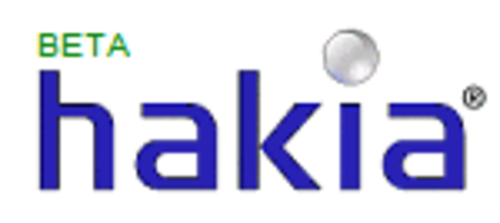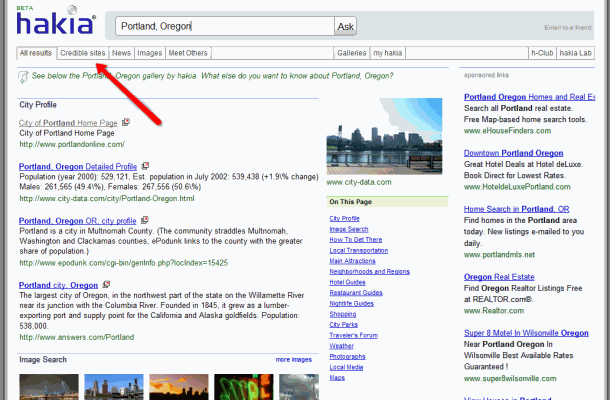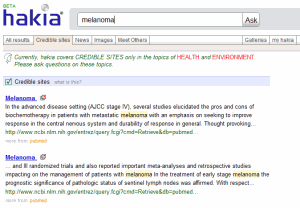Semantic search engine Hakiaannounced a major redesign of its site today, including the addition of ‘credible sites’ to its search index. In order to create this index of trustworthy sites, Hakia is asking volunteers to submit credible, peer reviewed sources. Credible sites are currently limited to health and environmental topics, but Hakia is planning to expand this quickly. By adding these credible sources, Hakia wants to go beyond ’10 blue links’ and give its users an alternative to popularity driven approaches like Google’s PageRank. Hakia has also added a ‘Galleries‘ section, which is a structured directory of some of the most popular search topics.

Credible Sources
In order to create this index of credible and trustworthy sites, Hakia is relying on volunteers. Hakia is specifically recruiting librarians, though it seems anybody can sign up, which could potentially leave the site open to spammers. Hakia asks submitters for their professional credentials, but it is not clear if the company will actually check these.

Hakia uses a very strict definition for what makes a site credible. To be included in the index, a site should have gone through a peer review process, not have any commercial bias, and the information should be current. The fact that Hakia insists on only adding peer reviewed sites should greatly enhances the signal-to-noise ratio of the search results.
Great Structured Results
In our tests, we were often impressed by hakia’s ability to structure its regular search results. For ‘Sarah Palin’, for example, Hakia organizes the results by official websites, images, news, biography, awards, and speeches. A search for ‘Portland, OR,’ on the other hand, first displays general information about the city, images, transportation options, and restaurant guides.
All results now also feature images and user-generate content.

Whenever we tried to ask more general questions (“What is a blog?”), however, Hakia’s results were often underwhelming and uneven. Sometimes we got results that were spot-on, while at other times, the results barely had anything to do with our query.
Hakia also introduced ‘my hakia,’ a personal start page which still looks a bit unfinished, but seems to rely on Hakia’s expertise in structuring search results to give users more background information about current events.
Overall, we liked Hakia’s updates and we are looking forward to the expansion of the ‘credible sources’ to other topics, as we were quite impressed with the results it returns already.

















